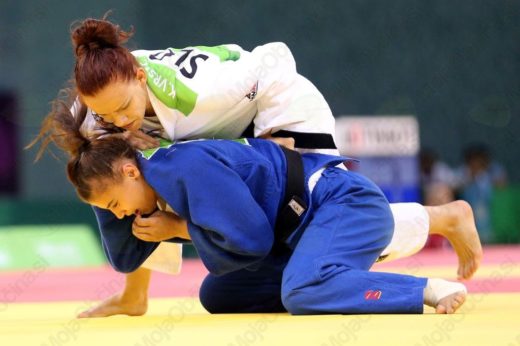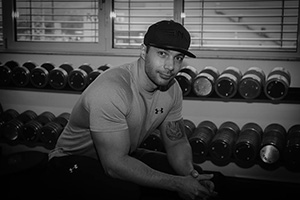Kaj pravi znanost?
Kreatin monohidrat je najučinkovitejši ergogeni prehranski dodatek, ki je trenutno na voljo v smislu povečanja zmogljivosti pri visoko intenzivne vadbi in povečanju telesne mase s treningom.
(Society of sports nutrition)
Je učinkovit pri športih, ki zahtevajo kratka in hitra ponavljajoča se ponavljanja z visoko intenzivnostjo (PCr <10s). (ACM – Nutriton and Atheltec Performance 2009)
Kaj pravzaprav je kreatin?
Če pogledamo kemijsko zgradbo je to C4H9N3O2.
Kreatin je sintetiziran iz treh različnih aminokislin; arginina, glicina ter metionina. Primarno ga telo proizvaja v jetrih (nekaj v ledvicah in trebušni slinavki) ter ga nato preko krvi pozneje skladišči v mišicah (nekaj gre v možgane ter srce). Lahko ga dobim tudi s hrano. Njaveč ga je v mesu in ribah (1kg surovega mesa vsebuje cirka 5g kreatina).
Kreatin se v 95% uporablja za energijo mišic pri anaerobnem alaktatnem (Pcr) energetskem sistemu. Približno 60% kreatina je v obliki fosfokreatina za takojšnjo proizvodnjo ATPja, ostalih 40% pa je prostega kreatina. Hkrati kreatin tudi pospešuje sintezo mišičnih beljakovin kar pripomore do večjih in močnejših mišic. Dodajanje kreatina torej služi kot povečanje koncentracije kreatina in fosfokreatina v skeletnih mišicah kar pripomore k boljši zmogljivosti pri eksplozivnih športih ter športih moči.
Kljub različnim in obljubljenim boljšim oblikah kreatina, je večina študij narejena prav na kreatin monohidratu, ki velja še vedno kot najbolj učinkovit med vsemi oblikami.
Kako ga uživati kot dodatek?
Čeprav je včasih veljalo pravilo, da je kreatin monohidrat potrebno v prvih 5 dni uživati 4x na dan po 5g (20g – faza nalaganja), je pozneje bilo dokazano, da ni potrebe po predhodni fazi nalaganja, saj enak rezultat dosežemo, kadar uživamo 2-4g kreatina na dan, 30 dni. Seveda, če se nam ne mudi, je ta metoda enako učinkovita ter cenovno ugodnejša. Za vzdrževanje nivoja kreatina v telesu, je dovolj 2g po treningu.
Kreatin in trening moči
Dodajanje kreatina kot prehransko dopolnilo bo vplivalo na:
- Kasnejšo utrujenost
- Hitrejše okrevanje
- Povečanje razvoja sile v poznejših obdobjih okrevanja
Posledično bodo ti dejavniki omogočili: 
- Višjo količino treninga
- Hitrejšo regeneracijo
Nemški proizvajalec AlzChem proizvaja najkvalitetnejši kreatin monohidrat na svetu, ki je redno testiran za morebitne nezažalene primesi.
Prav tako je večina študij narejena prav s em. To je zelo pomembno, saj kreatin sicer pogosto vsebuje nezaželene sestavine, ki nastanejo pri njegovi izdelavi. Ta proizvod se prodaja pod registriranim imenom CreaPure.
Andrej Rantaša
Reference:
- Antonio J, Ciccone V (2013) The effects of pre versus post workout supplementation of creatine monohydrate on body composition and strength. J Int Soc Sports Nutr 10:36.
- Allen RE, Boxhorn LK (1989) Regulation of skeletal muscle satellite cell proliferation and differentiation by transforming growth factorbeta, insulin-like growth factor I, and fibroblast growth factor. J Cell Physiol 138:311-315.
- Balsom PD, Soderlund K, Sjodin B, Ekblom B (1995) Skeletal muscle metabolism during short duration high-intensity exercise: influence of creatine supplementation. Acta Physiol Scand 154:303-310.
- Bazzucchi I, Felici F, Sacchetti M (2009) Effect of short-term creatine supplementation on neuromuscular function. Med Sci Sports Exerc 41:1934-1941.
- Burd NA, Tang JE, Moore DR, Phillips SM (2009) Exercise training and protein metabolism: influences of contraction, protein intake, and sex-based differences. J Appl Physiol 106(5): 1692-1701.
- Burd NA, Wall BT, van Loon LJC (2012) The curious case of anabolic resistance: old wives’ tales or new fables? J Appl Physiol 112(7): 1233-1235.
- Burke DG, Candow DG, Chilibeck PD, MacNeil LG, Roy BD, Tarnopolsky MA, Ziegenfuss T (2008) Effect of creatine supplementation and resistance-exercise training on muscle insulin-like growth factor in young adults. Int J Sport Nutr Exerc Metab 18:389-398.
- Burke DG, Chilibeck PD, Davison KS, Candow DG, Farthing J, Palmer TS (2001) The effect of whey protein supplementation with and without creatine monohydrate combined with resistance training on lean tissue mass and muscle performance. Int J Sport Nutr Exerc Metab 11:349-364.
- Candow DG, Chilibeck PD, Facci M, Abeysekara S, Zello GA (2006) Protein supplementation before and after resistance training in older men. Eur J Appl Physiol 97:548-556.
- Candow DG, Little JP, Chilibeck PD, Abeysekara S, Zello G, Kazachhov M, Cornish SM, Yu PH (2008) Low-dose creatine combined with protein during resistance training in older men. Med Sci Sports Exerc 40:1645-1652.
- Candow DG, Vogt E, Johannsmeyer S, Forbes SC, Farthing JP (2015) Strategic creatine supplementation and resistance training in healthy older adults. Appl Physiol Nutr Metab 40(7):689-694.
- Casey A, Constantin-Teodosiu D, Howell S, Hultman E, Greenhaff PL (1996) Creatine supplementation favorably affects performance and muscle metabolism during maximal exercise in human. Am J Physiol Endocrinol Metab 271: 31-37.
- Churchward-Venne TA, Burd NA, Mitchell CJ, West DW, Philp A, Marcotte GR, Baker SK, Baar K, Phillips SM (2012) Supplementation of a suboptimal protein dose with leucine or essential amino acids: effects on myofibrillar protein synthesis at rest and following resistance exercise in men. J Physiol 1;590(11):2751-2765.
- Cribb PJ, Hayes A (2006). Effects of supplement timing and resistance exercise on skeletal muscle hypertrophy. Med. Sci. Sports Exerc 38:1918-1925.
- Cribb PJ, Williams AD, Hayes A (2007) A creatine-protein-carbohydrate supplement enhances responses to resistance training. Med Sci Sports Exerc 39(11):1960-1968.
- Cribb PJ, Williams AD, Stathis CG, Carey MF, Hayes A (2007) Effects of whey isolate, creatine, and resistance training on muscle hypertrophy. Med Sci Sports Exerc 39(2):298-307.
- Deldicque L, Louis M, Theisen D, Nielens H, Dehoux M, Thissen JP, Rennie MJ, Francaux M (2005) Increased IGF mRNA in human skeletal muscle after creatine supplementation. Med Sci Sports Exerc 37:731-736.
- Deldicque L, Theisen D, Bertrand L, Hespel P, Hue L, Francaux M (2007) Creatine enhances differentiation of myogenic C2C12 cells by activating both p38 and Akt/PKB pathways. Am J Physiol Cell Physiol 293:C1263-1271.
- Fujita S, Dreyer HC, Drummond MJ, Glynn EL, Cadenas JG, Yoshizawa F, Volpi E, Rasmussen BB (2007) Nutrient signalling in the regulation of human muscle protein synthesis. J Physiol 582:813-823.
- Green AL, Hultman E, Macdonald IA, Sewell DA, Greenhaff PL (1996) Carbohydrate ingestion augments skeletal muscle creatine accumulation during creatine supplementation in humans. Am J Physiol 271: 821- 826.
- Guerrero-Ontiveros ML, Wallimann T (1998) Creatine supplementation in health and disease. Effects of chronic creatine ingestion in vivo: Down–regulation of the expression of creatine transporter in skeletal muscle. Mol Cell Biochem 184: 427-437.
- Harris RC, Soderland K, Hultman E (1992) Elevation of creatine in resting and exercise muscle of normal subjects by creatine supplementation. Clin Sci 83: 367-374.
- Olsen S, Aagaard P, Kadi F, Tufekovic G, Verney J, Olsen JL, Suetta C, Kjaer M (2006) Creatine supplementation augments the increase in satellite cell and myonuclei number in human skeletal muscle induced by strength training. J Physiol 1:525-534.
- Parise G, Mihic S, MacLennan D, Yarasheski KE, Tarnopolsky MA (2001) Effects of acute creatine monohydrate supplementation on leucine kinetics and mixed-muscle protein synthesis. J Appl Physiol 91:1041-1047.
- Phillips SM (2004) Protein requirements and supplementation in strength sports. Nutr 20: 689-695.
- Persky AM, Brazeau GA (2001) Clinical pharmacology of the dietary supplement creatine monohydrate. Pharmacol Rev 53: 161-176.
- Safdar A, Yardley NJ, Snow R, Melov S, Tarnopolsky MA (2008) Global and targeted gene expression and protein content in skeletal muscle of young men following short-term creatine monohydrate supplementation. Physiol Genomics 32:219-228.
- Sartorelli V, Fulco M (2004) Molecular and cellular determinants of skeletal muscle atrophy and hypertrophy. Sci STKE 244:re11.
- Tipton KD, Rasmussen BB, Miller SL, Wolf SE, Owens-Stovall SK, Petrini BE, Wolfe RR (2001) Timing of amino acid-carbohydrate ingestion alters anabolic response of muscle to resistance exercise. Am J Physiol Endocrinol Metab 281:E197-206.
- Walker JB (1979) Creatine: biosynthesis, regulation and function. Adv Enzymol Relat Areas Mol Biol 50: 177-242.
- Welle S, Thornton CA. (1998) High-protein meals do not enhance myofibrillar synthesis after resistance exercise in 62- to 75-yr-old men and women. Am J Physiol 274: 677-683.
- Willoughby DS, Rosene JM (2003) Effects of oral creatine and resistance training on myogenic regulatory factor expression. Med Sci Sports Exerc 35:923-929.
- Wyss M, Kaddurah-Daouk R (2000) Creatine and creatinine metabolism. Physiol Rev 80:1107-1213.


